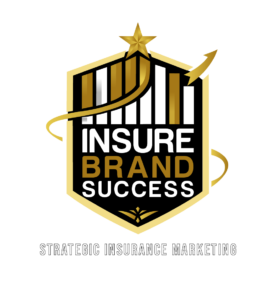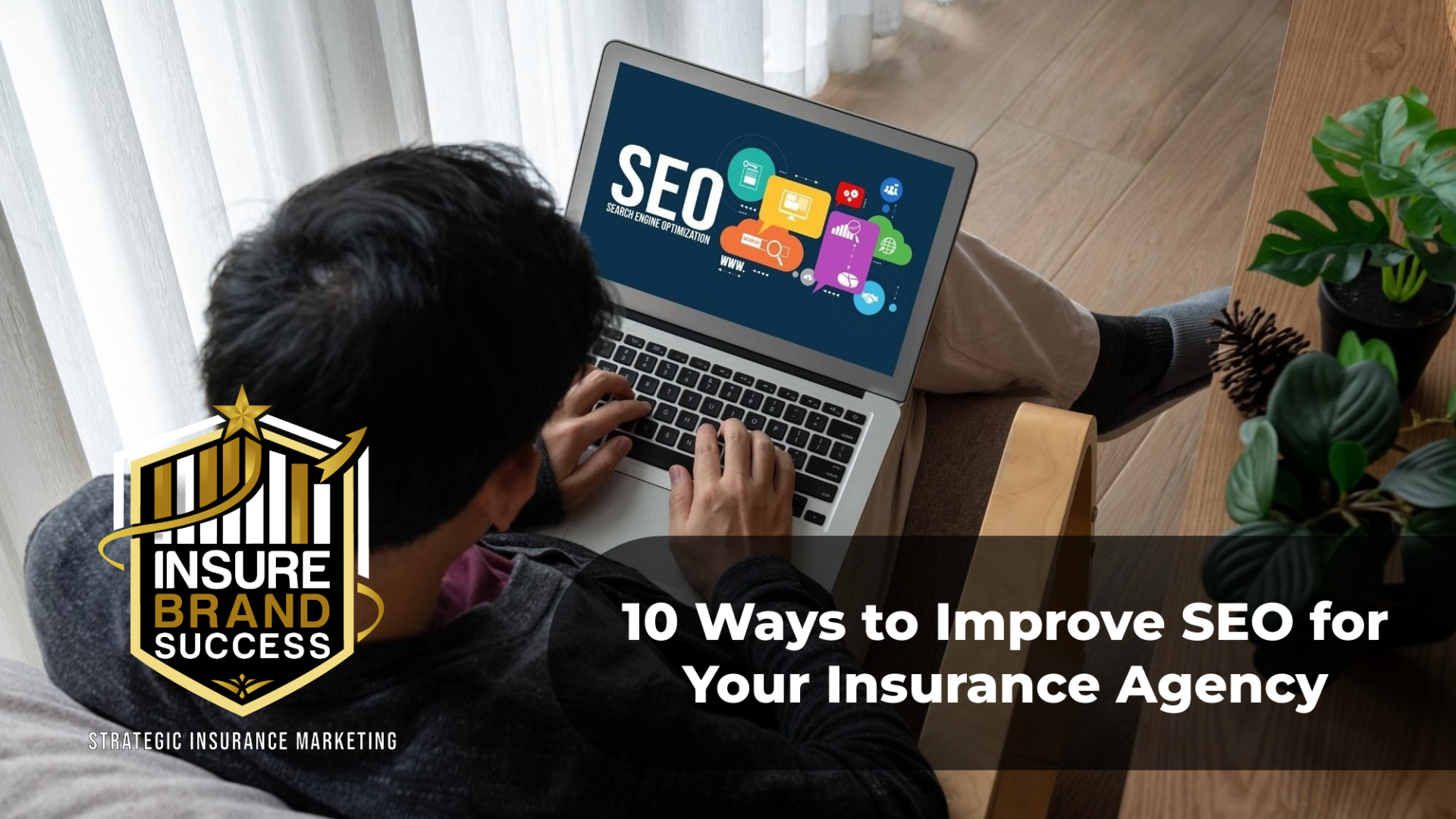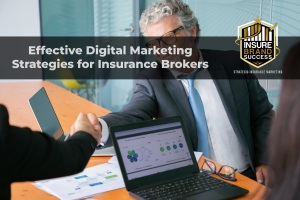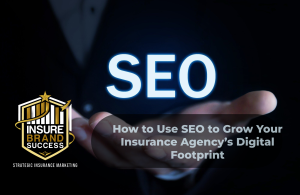In today’s competitive landscape, having an effective SEO strategy is crucial for the growth and success of your insurance agency. Not only does it help drive traffic to your website, but it also plays a significant role in acquiring and retaining clients. Whether you’re just starting to build your SEO strategy or looking to refine your current approach, the following ten methods will help your insurance agency rank higher in search results and capture the attention of your ideal clients.
1. Focus on Local SEO for Insurance Agencies
As an insurance agency, your clients are likely local or regional. Optimizing your website for local search terms can significantly boost your visibility in your specific market. Claiming and optimizing your Google My Business profile is one of the best ways to get started. Be sure to add accurate business details, including your address, phone number, and website link.
Furthermore, include local keywords throughout your website content. For example, if you serve the Chicago area, include terms like “insurance in Chicago” or “auto insurance near me.” These targeted keywords help Google connect your business with the right local audience.
Additionally, incorporating local reviews is vital. Encouraging satisfied clients to leave positive reviews can increase your trustworthiness in the eyes of potential customers and improve your local search rankings.
For more in-depth strategies on SEO for insurance brokers, check out our Insurance SEO Services.
2. Optimize Your Website for Mobile Devices
With more people browsing the web on their smartphones, mobile optimization is no longer optional—it’s essential. Google uses mobile-first indexing, meaning it prioritizes the mobile version of your website when determining rankings. A mobile-friendly website not only provides a better user experience but also improves your SEO.
Test your website on different mobile devices to ensure that all elements load correctly, and check for any functionality issues. Also, ensure that your website’s loading speed is fast on mobile devices. Use Google’s PageSpeed Insights to identify areas for improvement.

3. Create High-Quality, Relevant Content
Content is king when it comes to SEO. The more valuable content you produce, the more likely you are to attract potential clients. Focus on creating content that addresses your audience’s needs, interests, and pain points. You can write blogs, produce case studies, share industry insights, or even create video content.
By incorporating keywords like “insurance marketing strategies” and “digital marketing for insurance agencies,” you can align your content with the terms your target audience is searching for. Regularly publishing high-quality content also helps you rank for long-tail keywords, which are often less competitive and can generate targeted traffic.
At Insure Brand Success, we specialize in insurance marketing strategies tailored to your specific needs. Our Digital Marketing for Insurance Agencies service can help you develop a content strategy that engages your target market.
4. Leverage Client Acquisition and Retention Programs
Client acquisition and retention are at the core of every successful insurance business. SEO can be an incredible tool in both acquiring new clients and keeping existing ones. One effective way to engage clients is by using email marketing campaigns designed to nurture relationships over time.
Incorporate SEO into your email marketing by sending out valuable content that includes your targeted keywords. Additionally, build email lists by offering something of value—like an informative eBook or a free consultation—on your website.
5. Implement On-Page SEO Best Practices
On-page SEO is a critical aspect of improving your website’s ranking. This includes optimizing title tags, meta descriptions, headers, and image alt text. Make sure your targeted keywords are naturally incorporated into these elements, ensuring that your pages are easily understood by both users and search engines.
One key aspect of on-page SEO is ensuring that your website is easy to navigate. A clear, logical structure makes it easier for search engines to crawl your site and increases user engagement, reducing bounce rates.
6. Boost Your Backlink Profile
Building a strong backlink profile is one of the most effective ways to boost your SEO rankings. High-quality backlinks from reputable sources signal to Google that your website is trustworthy and authoritative. Look for opportunities to guest post on reputable industry websites, collaborate with other businesses in the insurance field, or even get featured in local media.
Backlinks from authoritative sources like the National Association of Insurance Commissioners or the Insurance Information Institute can have a positive impact on your SEO efforts.
7. Invest in Google Ads (AdWords) for Insurance Agencies
Paid advertising, particularly Google Ads, can be an excellent complement to your SEO efforts. By bidding on targeted keywords related to your services, you can drive immediate traffic to your site while working on organic SEO.
For instance, if someone searches for “auto insurance quotes near me,” running an AdWords campaign targeting that search term will help your agency appear at the top of the search results. While it’s important to focus on long-term organic SEO strategies, using paid search as a short-term solution can provide valuable leads.
Our AdWords for Insurance Agencies service can help you set up and optimize your paid campaigns to drive measurable results.
8. Utilize Social Media Strategies for SEO
Social media may not directly impact your search rankings, but it plays a crucial role in building brand awareness and driving traffic to your website. By sharing content and engaging with your audience on platforms like Facebook, LinkedIn, and Twitter, you can generate social signals that indicate to Google that your brand is active and relevant.
Additionally, social media posts that include links to your website increase the chances of gaining backlinks and referrals, both of which positively impact SEO.
Our Social Media Strategies service can help your agency craft a tailored social media plan that aligns with your SEO objectives.
9. Optimize for Voice Search
With the increasing use of voice assistants like Alexa and Siri, optimizing your website for voice search is more important than ever. People use voice search differently than they type, often asking questions in a more conversational tone. Focus on targeting long-tail keywords and phrasing that matches natural speech patterns.
For example, instead of just optimizing for “insurance quotes,” consider phrases like “how can I get a cheap auto insurance quote in Chicago?” Integrating these types of conversational keywords into your content can help you capture voice search traffic.
10. Analyze Your Results and Adapt Your Strategy
SEO is not a one-time fix; it requires ongoing monitoring and adaptation. Regularly check your website’s performance using tools like Google Analytics and Google Search Console. Look at metrics such as traffic, bounce rates, and conversion rates to assess the effectiveness of your strategy.
Make adjustments based on the data. For instance, if you notice certain keywords are driving more traffic but aren’t converting well, consider tweaking your calls to action or updating your content to better match searcher intent.
At Insure Brand Success, we offer comprehensive SEO Solutions for Insurance to help your agency continuously improve and stay ahead of the competition.

FAQs
- Why is SEO important for insurance agencies?
SEO (Search Engine Optimization) is essential for insurance agencies because it directly influences your visibility online. When potential clients search for insurance services, you want your agency to show up at the top of search engine results. Without SEO, even the best insurance services can get buried on the web. A robust SEO strategy helps your agency rank for relevant keywords, ensuring that when people search for terms like “auto insurance in [your city]” or “affordable home insurance,” your website appears in front of them. Moreover, SEO not only drives traffic but also builds credibility. Agencies that appear on the first page of search results are often seen as trustworthy and authoritative. This visibility supports both client acquisition (by bringing in new leads) and client retention (by keeping your agency top of mind for existing customers).
- How can I optimize my insurance website for mobile?
In today’s digital age, mobile optimization is a must. Since more than half of all web traffic now comes from mobile devices, having a responsive website design is non-negotiable. A responsive design ensures that your website looks great and functions properly on any screen size—whether it’s a phone, tablet, or desktop. Beyond design, ensure that your website loads quickly on mobile devices. Slow-loading pages can frustrate users, leading to higher bounce rates. Google even takes load speed into account when ranking websites. You can test your site’s mobile-friendliness using Google’s Mobile-Friendly Test and optimize the user experience by compressing images and removing unnecessary code that might slow down the load time.
- What is the role of Google Ads in my SEO strategy?
Google Ads is an incredibly effective tool for driving immediate, targeted traffic to your insurance agency’s website. While SEO takes time to show results, Google Ads (formerly AdWords) allows you to quickly appear at the top of the search results for specific keywords. For instance, when someone searches for “cheap car insurance,” your ad can appear right at the top, leading them to your website. While Google Ads doesn’t directly affect your organic SEO rankings, it complements SEO efforts by driving high-intent traffic. Think of Google Ads as a short-term strategy to bring in leads while you build up your organic rankings over time. And, because you can target specific keywords and demographics, your ads can reach the exact audience you want—those actively looking for insurance services.
- How do social media strategies impact SEO for insurance agencies?
Social media doesn’t directly impact SEO rankings in the traditional sense, but it’s an essential tool for increasing brand awareness and driving traffic to your website. By sharing informative blog posts, articles, and resources on platforms like Facebook, Instagram, LinkedIn, and Twitter, you generate social signals that Google notices. These signals, while not a direct ranking factor, can help establish your agency’s authority and relevance. Social media is also a great way to engage with your audience, answer questions, and build a community. As you share your website content on social media, you may generate backlinks when others share your posts or reference your content, which indirectly boosts SEO.
- What is local SEO, and how does it benefit my insurance agency?
Local SEO is the practice of optimizing your website and online presence for location-based searches. Since most people search for insurance services specific to their area (e.g., “life insurance agents in [city]”), local SEO ensures that your agency shows up for these searches. The key to local SEO success is having a well-optimized Google My Business profile, where you can list your address, phone number, website, and hours of operation. The more relevant and accurate this information is, the more likely you are to appear in local search results and Google’s Local Pack (the map section at the top of search results). Additionally, encouraging satisfied customers to leave reviews on your Google profile and other local listing sites improves your credibility and visibility, helping you stand out from competitors.
- How do backlinks improve SEO for insurance agencies?
Backlinks are links from other websites that direct users to your site. They are a critical component of SEO because search engines like Google view them as votes of confidence. If reputable, authoritative websites link to your content, it signals to Google that your content is credible and valuable. For insurance agencies, getting backlinks from authoritative industry sites or local media outlets can dramatically boost your SEO rankings. One way to build backlinks is through guest posting—writing articles for other websites that include links back to your agency’s site. You can also partner with local businesses, write industry-relevant blog posts, or participate in industry discussions to build these valuable links.
- What are the key components of on-page SEO for my insurance website?
On-page SEO refers to optimizing individual pages of your website to rank higher in search results. Key components of on-page SEO include title tags, meta descriptions, headers (H1, H2, etc.), image alt text, and URL structure. Each of these elements helps search engines understand what your page is about. For example, using your targeted keywords in these areas (while keeping the content natural and user-friendly) can significantly improve your chances of ranking for those keywords. Additionally, ensure that your content is well-organized and provides real value to users. Google rewards websites that offer comprehensive, well-written content that answers users’ questions effectively.
- How often should I update my website content for SEO?
Regularly updating your website’s content is key to maintaining strong SEO rankings. Google loves fresh content, and regularly updating your blogs, adding new landing pages, and keeping your service offerings up-to-date can help you stay relevant in search results. This also shows users that your business is active and engaged. You can repurpose older blog posts by adding new information, statistics, or case studies. Doing so allows you to target new keywords or reach new audiences without starting from scratch. The more current and authoritative your content is, the more likely it is to rank well.
- Why is website speed important for SEO?
Website speed is a major factor in both user experience and SEO. Google considers page load speed as a ranking factor, meaning that slower websites are less likely to rank well in search results. Users are also less likely to stay on a website that loads slowly, leading to higher bounce rates. If you want to improve your SEO, focus on making your website load as quickly as possible. Use tools like Google PageSpeed Insights to identify areas that need improvement, such as image compression, JavaScript optimization, or server response times. A fast website is not only better for SEO, but it also creates a better experience for your users.
- How do I measure the effectiveness of my SEO efforts?
To evaluate the success of your SEO strategy, use tools like Google Analytics and Google Search Console. These tools provide valuable insights into your website’s performance, including traffic sources, bounce rates, and keyword rankings. You can track how your rankings change over time, how much organic traffic you’re receiving, and whether those visitors are converting into leads or clients. Another key metric is conversion rate, which shows how well your website turns visitors into actual clients. By regularly monitoring these metrics, you can identify areas for improvement and adjust your strategy accordingly.




